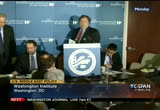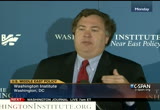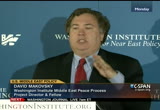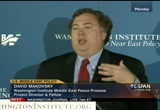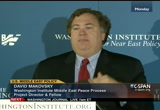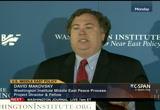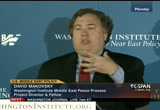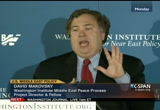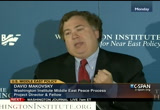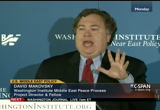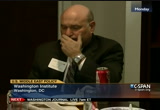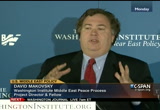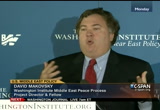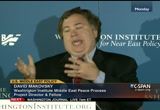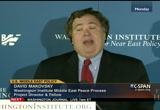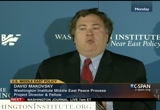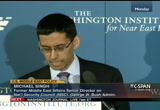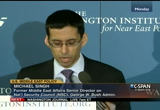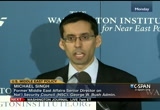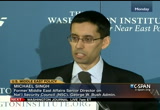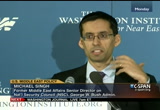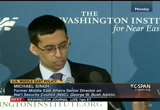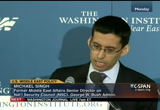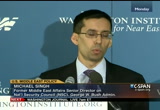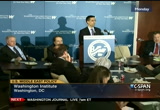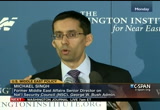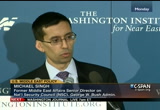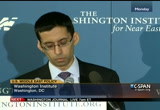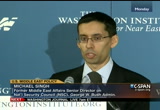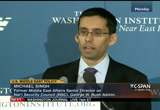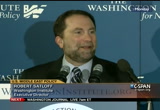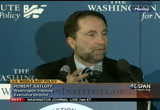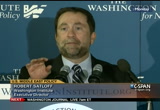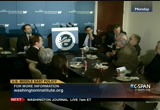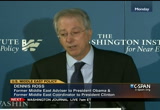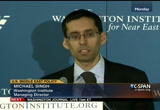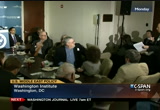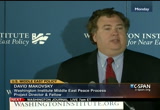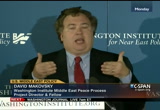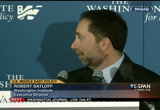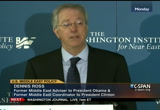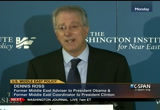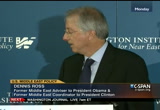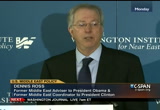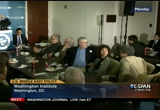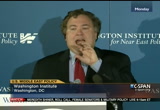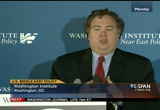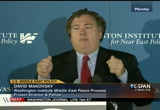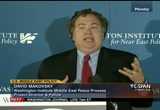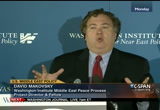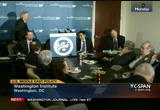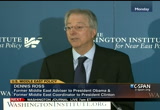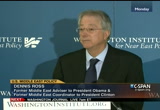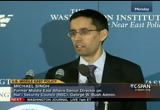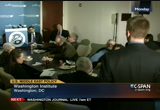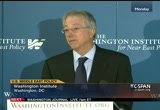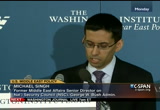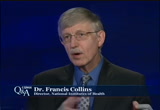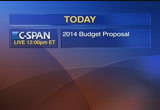tv Politics Public Policy Today CSPAN March 19, 2013 6:00am-7:00am EDT
6:00 am
>> david? >> it is good to be on the panel with my colleagues. i just came back yesterday. while dennis and i have our own convergences, i made a less upbeat having returned from there. it could be a question of how these things are put forward. i agree with him definitely on the public peace. i cannot see obama, but succeed on the public part of the trip. it is two trips in one to israel. the public part, you'd be hard- pressed to find a ford minivan'' worth of israelis that are anti- american. they want to like an american president. whatever their differences, for the most part, every stop along the visit is designed, choreographed to touch deeper chords in israeli society, whether it is the shrine of the books, or the stop at hertzel's tomb, or talking to israeli kids about their future in the 21st century.
6:01 am
these are things obama will do very well at. i think this trip -- i would be surprised if it is not a success. there'll be some pickups, -- some hiccups, but the big piece, the public part i think is going to be successful to the extent it can. the way i see it, some say obama is just checking a box. i think he sees that the way towards managing his relationship with the israeli government runs through the israeli public. it does not mean that netanyahu is completely poll focused. i think the issue of iran as a gut issue for netanyahu. it is not just looking at public opinion.
6:02 am
certainly having public opinion more on his side, even if it is not a dramatic change, could only help the president as he relates to the new government. i would say that is the first part. there dennis and i agree. the policy summit, these guys will be having something like five hours together, probably the most intense conversations and time netanyahu and obama have ever spent together. obama has said there is not any leader he has sat with more than netanyahu. this is the most intense period of time that they have had. each one has sober expectations. they have been at this for four years. obama knows that they have different political visions. and it cannot do know is that netanyahu -- netanyahu knows obama is less inclined towards intervention. this could be a good thing. from the israel side, my sense is -- hear about the layout howe saw the conversation and then lay out some other key points, syria, lebanon, and the palestinian issue -- on iran, i
6:03 am
think it is clear that men -- that netanyahu people go in, when we hear that certain weaponry has been moved out of the goals, or diplomacy has been indecisive, how do they relate to that? the red line that denis mentioned and the iaea report -- they are down in a uranium. netanyahu will say, i have been vindicated and with red lines. i told you so, mr. president trip obama will say, maybe that means we have more time. mantinea welcome back and say, with these centrifuges, they can surge forward to the 230 kilograms of the need for 90% uranium within the 30-40 day-. -- day dash.
6:04 am
nobody is looking for confrontation. i think they can asked pointed questions in a cordial atmosphere about that. each one will look at iaea report and read into it what they want to read into it. netanyahu, red lines work. obama, maybe we have more time. the second issue is the concern israel has over diplomacy. here i think there is the fear that the ned states is headed towards a deal that israelis may consider a bad deal.
6:05 am
you could say, the israelis have no choice but to take it. that is the best they're going to get. that is a 20% deal on a uranium. after all, didn't you literally draw that line at 20%. he will say, yes, i do that. -- i did that. his fear is that you have iran on the ropes, in the corner, this is unprecedented the amount of international sanctions, i think the europeans -- the europeans, bank united states, and whatever you do not do now, you will not do. there is nothing more permanent in the middle east than that which is temporary.
6:06 am
if you let them off the hook, they will be left with 5.9 tons of enriched uranium, be it for bonds -- bombs. that could surge forward if inspectors are not there and they decide they want to go forward with new centrifuges. there is a key difference there. i do not see this being bridged at this time. another factor on iran. the new defense minister in israel, who is not viewed as hawkish on the issue. i cannot find one member of the security establishment that is for containment. i have been looking for years, and i cannot find them. right now, their view is if america is leading, holdback, but if america does not lead, the same people that have been urging caution will be the same people urging israel forward. i think a certain level, the tone will be very different from the past defense minister, but the message will not be fundamentally different. what about the other issues? here i think another issue that could come up in the meeting is the issue of circassia.
6:07 am
it definitely will come up. in an operational sense, there is a debate brewing in israeli policy circles about how active israel should be in going after hezbollah convoys, taking out weaponry. i find there is nobody in israel that i met that since the united states -- maybe you think this is a big mistake --of all the people i talk to, cannot meet anyone who thought the u.s. would be decisive in syria. they see it as such a mess that they do not see how it will be reversed.
6:08 am
at the same time, they are concerned about has allowed -- about hezbollah taking weapons into lebanon or keeping them in parts of syria as a depot of the run. there are a lot of israelis who want to start being more proactive in firing on has blocked convoys -- on hezbollah convoys. the israelis are stunned that russians have given an anti-ship missiles that can hit things in israeli ports grid these are very advanced missiles. -- ports. these are very advanced missiles. it is defense for them. at the same time, israel feels that there might be certain defensive measures. we asked them -- they are not out to doing any sort of border zone like they did in lebanon. i think the discussion on syria, some believe the country is disintegrating, some believe the regime is unraveling. i do not see a policy consensus. i do not know if it will be a sweeping discussion about syria, but maybe more limited. on egypt, i felt more optimism than i have in previous trips. before they were worried that egypt would cancel the peace treaty. now they believe there is such
6:09 am
chronic instability that they've got a lot of other things cooking and that this is not what they're looking for. some would point to egyptian progress in going after rockets after november. some will point to the flooding of certain hamas tunnels. even palestinian security people will say, they did not flood the tunnels that hamas uses strategically from sinai. i found more optimism there than i thought.
6:10 am
on the palestinian issue, on the other hand, here i find it a mess. no surprise. maybe i will start with ramallah. talking to people there and the president, they are brimming with confidence, overconfidence that they have israel in the corner, that they believed israel is isolated in the world, they read everything in the press that has been written, and they feel that the november trip to the u.n. was so successful that they are willing to go to the icc. when you say that israel may build this bottleneck area linking north and south, they say, fine.
6:11 am
the more palestinians you talk to who believe that it is either final status or bust, and buss means the u.n., and not interested in any sort of coordinated unilateral agreement, it is a dirty word there, you are really seeing confidence. i personally hope the president in his stay over there is able to talk to the president over there and speak to them about the limitations of that strategy two could go to the icc. israelis say they're going to the icc. that could tie them up for years in legal proceedings. i do not see how any of this brings peace. i'm concerned about it. i'm also concerned about decision making, i'm concerned about the isolation of prime minister fayyat. the palestinian press does not report on his activities anymore. on the one hand, the good news is that more money has arrived lately. since obama is coming, of course
6:12 am
the money is coming. that is about $600 million that has arrived in the last few months. now palestinians will be paid full salaries. there has been no change on the hamas reconciliation. they think hamas is focused on plo. they want a technocratic government. we want elections. they're not being supported. so long as they focus on the plo, the reconciliation is going nowhere. on the israeli side, i'm worried about the decision making loop. you're losing a few people who are known for restraint on this issue, the defense minister, two agents part of the octet. they are gone. now you have a more dovish agent on iran, more hawkish on the palestinian issue, though he is
6:13 am
not ideological. if you could convince him that there will be palestinian reciprocity, and they say things like to go states for two people, you'll see that he and his team will also adjust, but without reciprocity, they are not going to. you also have the head of the housing ministry, he used -- we used to have an orthodox person, or the ultraorthodox issue was the main issue. the head of the finance committee of the knesset -- it is a different consolation there that could make this more of an issue. this idea of a freeze beyond the barrier -- there are some people interested -- on the palestinian side, we will not justify the barrier. the college on the part by wall. why would we legitimize that?
6:14 am
-- they call it an apartheid wall. why would we legitimize that? this shows that it wants to deepen its connection with a abbas. bottom line, i think this is, there are some differences. i will lend some good news that i found that they have been hopeful, that they think there is strategic distress over the king of the assad regime. they are more relaxed about that. a much more relaxed about egypt. instead of believing the u.s. or "-- will reorder the middle east, i find that this is a sober kind of summit, about what is doable, and what is not doable.
6:15 am
there is a lot about the new israeli government, which i am happy to discuss in the question and answer. thank you very much. >> thank you. mike? >> thank you. it is good to be doing this. it is good to be on this panel with my colleagues. one of the great strengths about the washington institute, which makes it so nice to work here, to have colleagues like dennis and david, who are a great source of wisdom on this topic. i apologize to my dearest to have hd screens to have to watch me watch -- what to watch me eat lunch. we begin these things by saying, welcome mr. secretary, members of congress.
6:16 am
nobody knows any different. [laughter] that is the benefit of live stream. i was asked to do this in part because the last presidential trip to the middle east, rather to israel, was not by president obama, but by president bush. worked for him at the time. there was a presidential trip in may of 2008. that was to discuss israel and saudi arabia, the sexted anniversary of the israel's founding, and the world economic forum, where the president met with king abdullah of jordan. and there was a longer trip in january of 2008 when the president went to the middle east, a very long trip, which i can tell you -- you have to bear in mind that every single stock in each country involved a briefing memo. when we talk about places that president obama is and is not visiting, there is a personal interest for the nsc stocks -- staff. your memos you have to write, the fewer stops. it is interesting to compare the
6:17 am
middle east and our role in it, then and now. "down the major issues that my colleagues have been talking about. the clearest difference is iraq, which i will not dwell on. iraq in january 2008 was one of the main themes of the trip. that is why you go to kuwait to visit camps there. that is different now since the u.s. withdrawal. looking at other issues, the israeli-palestinian issue, and a degenerate 2008,-- january 2008, there was a combination of promise and alarm about a peace practice. promise because of the annapolis conference and the negotiating
6:18 am
process we were hoping to kick off at the time. of course we also had read after the conference a big dispute over some construction around to respond, and some things just do not change, but we managed to get over that after the president's trip and have a negotiating process. by may 2008, the negotiations were deep under way. now negotiations have been frozen for years, and hamas is more entrenched in gaza than ever before. we are facing a very different climate, a different situation. we had in may 2008, you had has allow waging war against lebanese government. -- hezbollah waging war against the lebanese government. you all said the u.s. and bringing to bear significant pressure against president assad in syria. now hezbollah is entrenched in
6:19 am
the lebanese government. lebanon since 2009 has been subordinated by the serious issue. and syria, we have come full circle, going from engagement with russia are assad, to pressure, even greater pressure on assad and we had in 2008. assad himself is probably regret in the support for al qaeda in iraq, which is coming back to bite him. when it comes to iran, i was reading an article recently in preparation for a different speech about the negotiations, the president saying, the last offer we made was meeting with was met with a relatively positive response from iranians. we were feeling optimistic, but we have to give them time and space of keeping our options on the table. that article was from 2006. that tells you little bit about how this issue has or has not changed. this is the issue that feels the most similar to where it stood in 2008. there are more sanctions.
6:20 am
iran's nuclear program has expanded as well. elsewhere, we have had arab uprising. even in 2008, our concerns about president mubarak and his ability to continue to rule egypt was high. that concern was high. at the time, we were trying to push for the development of political alternatives. also i would say for the gulf states, there were quite a few visits to the gulf states in those groups. that was a different relationship than the one we have now. it was very close with the gulf states, whereas now we find ourselves at a distance with the gulf states over issues like the
6:21 am
arab uprising, like iran, like syria. the clearest difference i would say is not on any one of these individual issues, as much as it is on the u.s. role in the u.s. in the middle east. in 2008, if you go back and read transcripts from the time, it is striking how down in the weeds we work on all these issues, whether it was the peace process, syria, or lebanon. the questions reporters were asking or in minute detail on each of these issues. if you look now at the type of questions that asked, we're just engaged at a very different level in the middle east, at a very different level of detail in issues like the peace process, lebanon, even syria and iran. i think the perception in the region is not only are we out of the weeds in a sense, but that we are stepping back more broadly from this region. when you go to the region, what you hear from people is a u.s.
6:22 am
withdrawal from iraq and afghanistan, the withdrawal from the aircraft carrier, which david mentioned, from the gulf, our passivity in the face of the complexity in syria and our refusal to get involved in that. our indifference to the liberal opposition in iran or egypt or offering -- bahrain. as well as our political dysfunction and budgetary issues here in the united states. the ironic part of this is a president obama came to office in 2008 talking about impeachment, but i think the legacy is quickly becoming one of disengagement from this region, stepping back. as i mentioned, i was just on a trip that took me not only to the gulf, but farther afield. the striking thing was that for all the differences that our allies have on syria or political islam or iran? the one talking point -- or
6:23 am
iran, the one talking point i heard from all done is that they're looking for clear articulations of u.s. policy. they're looking for a stronger role, a more active role for the united states. we often feel in the united states that we are not wanted. maybe that is true to an extent in some quarters. we feel sometimes -- i think tennis alluded to this when he was talking about the way the it administration began -- that because of mistakes or missteps in places like iraq, that people would like to see us go.
6:24 am
in fact, the opinion is quite the opposite, because of errors, they view us as having more responsibility for securing the region, which is obviously a gap between how we perceive it here. that perception, whether right or wrong, whatever its cost -- there are a lot of unknowns in the region, which makes it difficult to come up with a coherent strategy -- that perception is undermining our policy. our allies for example are hedging their bets because they're not sure if they can count on us. this is clearest with israel. i agree with my colleagues that part of this visit to israel for president obama will be trying to inspire confidence in our ally. i think it is true more broadly as well. you see for example the gulf states acting more autonomously. this idea of a hub and spoke model in the middle east which it talked about before, with the u.s. as a center, our allies on --is polk, that has changed. on the pspokes has changed. it is not clear what the new structure will be, whether we are at the center or periphery. the transitional countries, egypt, libya, i think they're not convinced of the value proposition of an alliance with united states. that is a problem for us. and of course our adversaries, iran, and groups affiliated with
6:25 am
iran, have this perception, which i think is wrong, of the united states in being at some sort of irreversible decline. if they wait, we will eventually disengage and they do not need to worry about what we might do. this visit to the middle east needs to be a fresh start for president obama. i think there has to be a renewed commitment to the region. it has to start worrying less about public opinion -- hear maybe i defer to my colleagues in saying, i think it would be a mistake to look at this visit in terms of the public aspect, public diplomacy -- i think we worry too much about public opinion in the region, and it will impact public opinion. we are not in the interest of our allies as much.
6:26 am
we need to go and talk to these governments about a shared interests and convince them that we are going to act to advance our interests. if we do that and our actions follow that, but publics will come around as well. when it comes to democracy, i think the arab uprisings have proven a very challenging to the idea of supporting democracy. what we need to realize is that in a place like egypt, supporting democracy means more than backing the victors of elections. those victories may themselves act and democratically. -- may act undemocratically. it means supporting repeated elections, not just one election. we need to focus more on that, more on building this fabric of democracy, and less unfeeling as the week to endorse whoever wins an election. finally, i think we need to be prepared to judge on our actions, not just our words. going to give another high- profile speech is not want to cut it. people want to see action, especially because there is a view that the 2009 speech was not carried out, it did not translate into policy.
6:27 am
the places where we will be most judged on our actions will be syria and iraq. in syria, we need to stake out a strategy, we need to put resources behind it, we need to put a coalition behind it. it is damaging this idea that the united states is passive when people see syria as the most urgent and immediate national security priority for the united states and our allies. when it comes to iran, we need to reconcile the conflicting messages were sent on iran. we say the military option is on the table. we will not hesitate. then we take an aircraft carrier of the gulf. talk about preventing iran from getting nuclear weapons capability, but then we are prepared to make concessions in a negotiation that are difficult to understand. what we need to do is clarify the objectives, and i think
6:28 am
denis mentioned this -- what does prevention mean? how do we think of this idea of a nuclear weapons capability? is it the same as our allies, especially israel? you saw little bit of dissonance over the tests in the president's remarks about iran being one year or more away from a nuclear weapon and other remarks about them not deciding whether or not they're going to make a nuclear weapon. underline that is a common view underlying that is a common view, but we have a hard time articulating that view. if you can clarify that objective, that perhaps this is about preventing an undetectable break out, then you can start to explain your negotiating behavior, the concessions you're
6:29 am
willing to make in terms of that objective and persuade your allies that in fact your stance on these negotiations does not undermine the objectives you share. these are two examples. these are the most important. the most important message that needs to come out of the strip is that we're getting back in the game on all these issues, that we are getting back into the weeds. thank you very much. [applause] >> very good, three very insightful presentations about different aspects of this trip. lots of different angles in which we can address this topic. i remarked to myself about david's use of the word sober. he actually found a good news in the fact that egypt is near collapse and because of this, egyptians are so focused internally, they do not have time to make mr. on their -- make mischief on their borders. i assume that is how the israelis are doing it.
6:30 am
two other little pieces of sobriety that i would put on the table quickly -- i do think there's something to the fact that both president obama and prime minister netanyahu got themselves reelected. in the world of political leaders, there is a special place for leaders to manage to get reelection. it is no small achievement. i think the level of mutual respect, be grudging perhaps, but the level of mutual respect goes up. it only operates in that rarified world of people who know what is involved in the entire process of figuring out and working and getting one salt reelected. they will be with each other for a period of time they will not try to undermine each other. this is really government is perhaps less solid and previous israeli governments. i do think there is something that contributes to the solidity of the relationship when the two leaders look at each other as reelected by their own politics. ironically, both men come to the summit with a much heavier emphasis on the need to address the internal politics in their own countries.
6:31 am
6:32 am
there is a lot more to talk about in terms of jordan, and the very important message the president is sending by going -- his first trip to the arab countries since the series of uprisings. he picked a monarchy, and what message this sends elsewhere in the region is powerful. let me turn now to your questions and comments. please be kind enough to address your question to one of our participants so that all three don't have to answer every question. these be brief and wait for the microphone and identify yourself. we will start right in front here. >> the last few months, speculation that since the united states, president obama would be less active in israeli issues, that he may leave that to others, especially the europeans. which could mean not objecting to what the europeans are doing. measures have lately been taken that european countries -- an [indiscernible] any thoughts on that? >> i doubt that.
6:33 am
first, and i have said before, he chose to take this trip. the trip itself sends a signal that he retains an interest in this. number two, i will never be in the u.s. interest to see bad ideas adopted. we will have to pick up the pieces anyway. those that think he is washing his hands of it -- if he was, he would not be taking a trip there. number two, the secretary of state made it clear that this is an issue of great interest to him. part of this trip is designed to not only send the president interest in it, but to create wind he hanged the that -- wind behind the bat. if you adopt ideas that, in the end will be distraught and, to try get something done, the united states will have a posture on that and will not remain indifferent.
6:34 am
>> i want to say something, to echo what dennis said. it is important, we use this term honest broker. it is important to keep in mind what this means. the term originates with bismark. the idea of it was not that you have a neutral mediator. there are lots of neutral mediators in the world. the idea of it was that you are close to both sides. the closest to both sides. only the united states can play that role. i think there was misunderstanding about that, early on in this administration. but somehow we needed to distance ourselves from one side or the other set of being quite close to the other. one thing we will hopefully detect is whether that view has changed. whether there is an understanding that the first
6:35 am
thing we need to do is establish the confidence and trust of both sides, not one or the other. it also means that there is no one else that can play this role. the injury is not so much that someone else come along and become the honest broker, but that more destructive forces will come into play. whether it is hamas, iran for example. >> thank you. on my left. >> thank you. my question is to both ambassadors and david. in this room if you expect, senator rubio advised the president not to do anything, not to change anything, not to launch any new initiatives. since then, we have heard that the president might demand a time table for ending occupation. is that a good idea at this time you go especially in view of the new israeli government?
6:36 am
>> dave, you want to start? >> the israelis are very relaxed in terms of believing that obama will come with some policy initiative, ultimatum, or summing of any sort. as jay carney said in the record, he was not going to come it -- they all believe him. the question is more, how do two new governments work together? secretary kerry wants to prioritize this among half a dozen issues, and you have a new israeli government that cannot help deal with this issue. i don't think this president wants the next four years a two state solution to expire. that is a strong statement. but that is really true when you think of the pace of settlement activity. that is not a big concern. even if you can do a grand deal, you can preserve the option for
6:37 am
a two state solution, that is very important. even though i do not think there is any drama or confrontation between these two leaders now, i think it would be a mistake, because everyone in washington has forgotten about the palestinian issue, and people in the middle east have bigger issues on their own agendas, but somehow this issue would fade out. i fear there will be an upsurge in violence or you will be digging fresh graves and be left with old problems. each side knows that this issue is not going away. it would be a mistake to put the focus on some sort of immediate confrontation. i don't say that. i do see that these two have worked with the palestinians to find a way out. i made my point about the un, because it might be seductive for the palestinians.
6:38 am
each side has got to find a way to go forward. what the policy options are, i would be happy to discuss it. i don't see this issue fading out. i see an imminent collision. >> let me ask that differently. a gallant effort of lowering expectations and turning this into a listening tour. almost as if this is a new president who has not already been in office for four years. we should not forget, the president actually has a middle east these plan on the table. may 2011, about which we hear very little mama almost nothing -- very little, almost nothing in the press briefings.
6:39 am
can the administration shell that, put it in a drawer and start fresh? and the people in region going to let him shelve it and start fresh? >> the key to what you are asking and what he is asking is very similar. what is to be done? what shouldn't be done is to launch something that you know is going to fail. what we have right now is a profound sense of disbelief on both sides. if you do something guaranteed to fail, all you will do is make the sense of failure a self- fulfilling prophecy. discussed what david was saying. there may not be a shelf life on the ideas the president raised. the may 2011 speeches, there were two within three days of each other, they reflect basic assumptions about what it takes in terms of goals for an agreement, and also parameters for trying to reach such an agreement.
6:40 am
the question isn't whether those ideas are ideas that somehow don't exist anymore, i think they exist. the question is -- what do you do now to deal with what is a stalemate? the longer the stomach is on, the deeper the disbelief -- the stalemate goes on, the deeper the disbelief. if this is lost, both sides will lose. you go through some disruptive process where the pain is intense on both sides. one of the reasons it says and make sense to say that nothing is to be done is because you will then end up dealing with the consequences of that. it seems to me, what this trip is about, is not so much that the president will forget ideas that he presented, but this is about talking with the leaders on each side without having expectations.
6:41 am
the problem when you go and expectations are high, the kind of private conversations you have a completely different. each side, having been there before, each leader in a situation like that then feels the need to get into much more of a defensive crouch. they are worried about, what is expected of me? i will never forget a trip i took to -- right after clinton had seen president assad in geneva. prior to the trip, the prime minister conveyed to us what it was he wanted out of it. he produced what he wanted to see come out of it. i walked into the meeting feeling highly confident. we did what you asked. the first thing he did was
6:42 am
immediately devalue what i came with. why did he do it? because he knew i was coming to ask something of him. if you go into these meetings in the expectations are very high, each reader is suddenly worried about what you are going to ask of them. when are low, you are in a better position to have a serious conversation and can explore the possibilities. maybe the way you frame that conversation is by talking about, what are the consequences of not getting anything done? with each side. if they are severe enough, how can we think together about what it is that could be possible? where could there be some points of commonality we could build on? i expect you will have, there will end up being serious conversations in private that are much more likely to be held precisely because no one is anticipating that he is coming in and laying a plan on the table. >> thank you. right here. >> jonathan reinhold, george washington university.
6:43 am
what are the consequences inside israel, from a dentist just said, of the feeling of being relaxed? when obama won the election, there was very much, we will have to come up with something and in that context, you mentioned that the palestinians have no respect for an interim agreement. if something like that was put forward, wouldn't it inevitably move forward because you can't really say no to something like that? >> i'm glad you enabled me to answer this. the one new idea i heard on the palestinian side was the idea of a mutual freeze. timeout, six months, we don't do anything at the u.n. and just talk. but to do that, we want the israelis to freeze settlements everywhere.
6:44 am
the israelis like the first part, not a second. they consider that a nonstarter. the palestinians consider a nonstarter anything beyond the barrier. you get into a lot of these issues that are very hard. the question is, i kind of dangle this idea of reciprocity. the one hook i saw some light, if each side saw that the other side was doing something, then maybe they would do something. the problem is, i don't see them doing the full freeze. israel will not value the full freeze. i think it gets to dennis's point on the disbelief. there was also an op ed in the "washington post", how could it be that each side is for
6:45 am
resolution but the other side isn't? there has got to be something where these leaders have an interest. the question, what if nothing is done? there will be a radicalization. i am concerned about that. what that reciprocity will mean, i do not know yet. when i tried out this idea, much more focused on public confidence building, i got shot at by both sides. nobody wants to take that sort of time and they don't want to engage in that in that way, maybe because they feel the obligation is on them to reciprocate. i feel that somehow, reciprocity has got to be that one light wear whatever it is, it somehow is the baseline for moving things awkward. even if it is not as sweeping.
6:46 am
>> can you take 30 seconds and give us a little bit more in the weeds assessment of who in the new israeli government takes responsibility for these issues? what is the role between the nonexistent foreign minister, the new minister of finance has an interest in this, etc.? don't take us deep underground, but you know -- >> ok. you were right when you talked about how the domestic agenda is pivotal for both governments. in a way it has not been in the past. that is true. the question for me is, netanyahu had the forum where he felt he had a partner there in the defense minister. he does not have the same relationship with the new
6:47 am
minister. he looks around the table and sees for guys, they want to inherit him while he is still alive. lieberman, has legal issues but sees himself coming back. another guy who is going to run against him, and then it part of the new party on the right. i think you have a knowledge deficit that you did not have the last time around. these three guys are gone, and the question is, does that mean the brakes have come off the train? now it is more of a runaway car? you say no, lapid is there. people who may not have the same experience, but maybe our counterpoints to some of the other forces.
6:48 am
what is unclear to me yet is to what extent that for rum -- forum, how central is that going to be? what will that knowledge and deficit of experience mean? he definitely sees that his goal is that israel be a normal country than the middle class has a better quality of life, it sounds familiar to people here. the road to that is dealing with the palestinian issue. everything has to work this out. i don't know what that means. and it gave an interview and was quoted, when the reporter asked him about iran, he said, i have no clue. this is a guy on the inner sanctum of israel. he says, i have no clue. i just wonder how this
6:49 am
constellation is going to configure itself. i would hope that a lot of time, the foreign diplomats, whether it is in europe, our country, that we spend a lot of time with these new people then be sitting around the table. the central factor, i don't want to go to mention the weeds, these two guys, bennet and lapid have the central access to the government. he is convinced to break that alliance the day after the election. he will do it and get a government more to his liking where he can keep his base. he found out that these two guys who had only met once before the election, they live right near each other, they have almost identical views. i would look at these two young
6:50 am
guys and see, just as netanyahu cannot break the alliance in the run-up, to what extent will he they be a force going forward? >> thank you. i have some questions over here. 1, 2, 3. and over here. >> victor. isn't there a public message then he is to be sent to a around in the israelis -- iran and the israelis and what is that critical message? >> i think the essence of that message is that when the president says that prevention is the objective, he means it. the key to coercive diplomacy working is having no doubts about the readiness to fulfill
6:51 am
the threats you make. mike was saying there has been some mixed messaging, i think he is right. the way to deal with that is to make sure there is one consistent message. i don't get requires the president to say anything he has not said. i think it is consistent -- his message has been pretty much consistent. i think it is important that when he talks about iran, inevitably it will come up, because the focus will be that way and israel. if he gets questions when he is in jordan, i would hope she would say something about iran there as well, so it becomes clear when he is talking about iran, it is not only because he is in israel. he needs to have a message for iran that is consistent wherever he is. the end of the day, the iranians, by their behavior, have signaled that they tend to respect certain kinds of
6:52 am
threshold. the more they become convinced that we want diplomacy to succeed, our message should be that we want diplomacy to succeed. that will be up to the iranians. when the president says, the clock is ticking. the window will close. that has to be clear. that in fact, there will come a point where if we do not see a change in iranian behavior, we will act to fulfill the objective the president has laid out. >> i want to build on what he said. i think i would go a step further, i think that this is not really a u.s.-israel issue. we portray that way very often.
6:53 am
that is primarily because the u.s. and israel are the two countries in the world which could use independent force against iran. the jordan dating -- the jordanians are just as concerned about it. when i went to the gulf i heard about it from everyone in the region. that includes the iranians. the message the iranians, in addition to a tennis said, has to be that the israel are together on this. not just the u.s. has israel's back, but we share some kind of objective. there is a danger that israel is a strategic asset to the united states. the united states is undoubtedly a strategic asset to israel. severing that alliance would the a boon to a country like iran. we don't want the iranian regime to feel that through their actions, getting in some space between israeli and u.s. redlines, that they could
6:54 am
somehow factor that alliance and achieved some objective. even during a military attack from israel or from others. if you have it in their minds, there is an incentive for them to push forward, beyond the israeli red line, which can be very dangerous. there has to be a clear message, not just about prevention, but also about the solidarity between the u.s. and israel on our objectives on our redlines. >> thank you. my name is connor, i'm from the project on middle east democracy. it was mentioned that obama's first trip to an arab country will be to a monarchy after the arab uprising. what message does this send to the jordanian people? how will be perceived -- many are still asking for new election law, increased local representation. what about bahrain where the
6:55 am
u.s. has been silent on many human rights abuses? how will he ensure the people that he is still committed to the values of human rights and democracy? >> the best posture on this is also not unlike the iranian issue. this is not an issue for one place that he goes to. we should have a set of common principles that we are talking about, repeating all the time in the area. yes, he is going to a monarchy. yes, we have a very strong strategic stake in the well- being of jordan and of the king and his government. the president in public should emphasize our commitment to jordan, he should also emphasize our commitments to a set of principles and how we want to do them fulfilled everywhere.
6:56 am
privately, i think the focus should be on how can we work with jordan to improve their governance? there are few things that will have more of a positive effect over time and enhancing the effectiveness of jordanian governance. the mix of public and private messages is something that should be part of this trip overall. >> let me say, i don't think -- in part, the premise of the question is not fair. i don't know if it would be right to say that the united states has been silent on any human rights abuses anywhere. the policy today should be the policy that we had in 2008 areas should be helping each one of these countries in its own ways to find the right path toward political and economic reform. it is a difficult path. one thing the arab frustrating arab uprising demonstrated was
6:57 am
that this is a difficult path to find a political evolution that leaves everybody in the country better off. that might be superior to revolution. when he goes to jordan, they have been a close ally. there is an interest there in the government in reform. that will be part of the conversation. our role there is going to be to support that process, in a sense. frankly, i agree with dennis that this is both a strategic issue for the u.s. and israel as well. this will undoubtedly come up in >> we can take pictures of the brain. there is a gap in between about how the circuits of the brain function, in order to be able to move my hands or to look at you and assess that information
6:58 am
or lay down a memory. how it works. technology is yet to be invented, this will a lot be technology development. nanotechnology. we need to be able to record many hundreds of thousands of rentals at the same time. and therefore be able to understand how the circuits work. as the map and talk about. very early days. it is getting to be a very exciting moment to put something together that we could not have thought of. >> or with nih director dr. lins, send an edit clock on c-span's q&a. members discuss paul ryan's 2014 budget proposal. the continuing
6:59 am
resolution to keep the federal government funded through the end of the fiscal year. at 10:00 a.m. on c-span3, the head of the federal finance agency testifies about the finance market are. >> 34 years >> the c-span networks, created by america's cable companies in 1979 and braut to you as a public service by your television provider. >> and in 45 minutes on washington, d.c., congressman steve appears g.o.p.'s political strategy is discussed. at 8:30 eastern,
118 Views
IN COLLECTIONS
CSPAN Television Archive
Television Archive  Television Archive News Search Service
Television Archive News Search Service 
Uploaded by TV Archive on

 Live Music Archive
Live Music Archive Librivox Free Audio
Librivox Free Audio Metropolitan Museum
Metropolitan Museum Cleveland Museum of Art
Cleveland Museum of Art Internet Arcade
Internet Arcade Console Living Room
Console Living Room Books to Borrow
Books to Borrow Open Library
Open Library TV News
TV News Understanding 9/11
Understanding 9/11